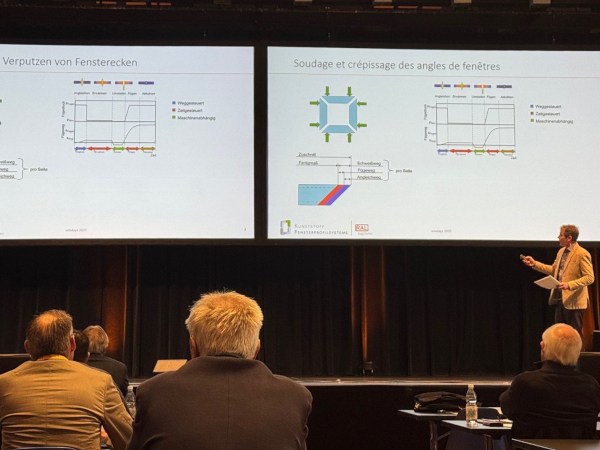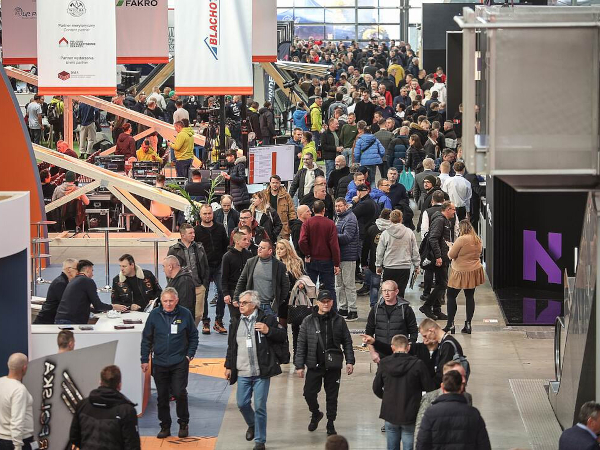
Date: 6 February 2023
Construction 4.0 and the digitalization of the construction industry: The latest technologies such as artificial intelligence, machine learning or robotics are increasingly being used in the construction industry. Digital tools are gradually establishing themselves in the construction industry. But this is just the beginning of the transformation, because the future of construction is digital. At the BAU 2023 trade fair, experience how promising and efficient the future of construction is being shaped by new, state-of-the-art tools and aids.
What does digitalization in construction mean?
Digitization in the construction industry is multi-faceted: it involves digital tools, process automation and digital project communication. Thanks to the wave of digitization, the immense volumes of data from construction processes are now also being efficiently organized and structured via cloud computing.
But these developments are not just about collecting, providing and processing digital data. Social networks, for example, play an equally central role, as all industrial sectors now communicate their activities transparently and digitally. Thus, the digitization of the construction industry defines universal processes on the Internet, ranging from planning and execution to documentation and communication. Today, time- and location-independent communication channels and digital infrastructures are therefore also indispensable in the construction industry.
However, digitization projects in the construction industry also harbor challenges as well as promising opportunities.
Opportunities and challenges of the digital transformation
Advantages of digitization in the construction industry:
- More efficient, simpler processes in construction: With the help of new process structures, planning and construction projects can be made more transparent, more reliable and less prone to errors. Software that creates a digital twin of a real building is used for this purpose. Stakeholders use these models to record and manage data and see building changes in real time.
- Improve environmental performance of buildings: Digital models help reduce environmental footprints. Designs are quickly calculated digitally and adjusted just as quickly depending on building requirements.
- Faster workflows through automated processes: Cloud solutions not only save paper. They are suitable for agile, efficient collaboration in construction projects because they can take over small tasks such as reminders for maintenance processes.
Key challenges of digitization in the construction industry:
- Building specialist expertise among employees: In order to properly apply digital solutions, basic knowledge and sufficient in-house specialists are needed. According to the PwC study "Challenges facing the German construction industry in 2021", the construction industry is confronted with aspects such as internal acceptance and appropriate cyber security.
- Connecting the analog and digital worlds: Industries have so far been characterized by analog. Today, this leads to networking and digitization strategies becoming complex tasks.
- Invest in digitization: For digital implementations, the crisis-ridden construction industry needs financial resources to manage the transformation—and time for implementation.
What this means in practice: The use of digital technologies must save costs in the medium and long term, sustainably increase customer satisfaction, and have a production-efficient effect. Only in this way does it make sense for the construction industry to continue to drive forward the digitization of the construction industry.
What is the current state of digitization in the construction industry?
Other sectors, such as the automotive industry or mechanical and plant engineering, are well ahead of digitization in the construction industry: The PwC study on the challenges facing the German construction industry showed that the hoped-for digitization boost from the pandemic failed to materialize.
The opportunities for digitization in the construction industry had been recognized, but the potential of new technologies had not been sufficiently exploited due to a lack of basic knowledge. There is a gap between existing technological potential and the actual skills of skilled workers. However, the construction industry is catching up step by step in all phases and together with the stakeholders, especially in terms of digital planning: 47 percent of all respondents stated that their own company had a high level of digitization. Although the study shows that technological potential is not yet being exploited, the construction industry is well on the way to transformation.
It won't work without digitization in the construction industry
The necessary foundations for digital transformation include cloud applications, for example: They enable large volumes of data to be stored in a central location. This data will later be a prerequisite for standardized and automated manufacturing processes on the factory floors. Without digitization of the construction sector, the industrial manufacturing industry will therefore face massive challenges.
In the wake of these developments, 82 percent of small & medium-sized enterprises are now planning to develop new services and business models, according to the DIHK Innovation Report 2020. For large companies, the figure is as high as 96 percent. What the construction industry urgently needs to meet the challenges is summed up in four words: infrastructure, corporate interest, skilled workers, builder competence.
Trends in the construction industry—digitalization in construction
Digital infrastructure includes digital tools. They change planning and implementation processes of construction projects. The most concise digitization trends and current developments at present:
- BIM as the leading technology in modern construction: Building Information Modeling (BIM) works by means of software that represents a digital twin of a real building. With BIM, virtual modeling and visualization are possible—from construction and equipment to maintenance and repair. In short, BIM covers the entire life cycle of construction projects. This leads to a lower error rate, less material consumption and reduced time thanks to digital visualization.
- Internet of Things (IoT) as the basis for the autonomous construction site: The IoT networks devices and construction vehicles with each other, for example. In addition, technology development in the construction industry can, for example, take over the intelligent control of systems for heating, ventilation and air conditioning in buildings.
- AI, machine learning and Big Data: Artificial intelligence is used to identify process patterns and optimize workflows. Based on data sets, it is also possible to solve problems more efficiently. The generated data sets are fundamental for modernized business processes.
- Robotics in construction: Autonomous machines are more efficient and guarantee faster processes because they work more precisely. Automated process controls with robotics minimize the risk of injury and reduce labor costs. Robots also fill the gaps of the ongoing shortage of skilled workers in the long term.
- 3D printing is making inroads: 3D printing technology allows components to be developed faster and with less material consumption. As a result, development processes are more flexible and components can be customized.
- Drones are coming into use: The flying mini-computers are used to inspect, visualize, monitor and measure ongoing construction projects.
- Apps in everyday life: Craftsmen are increasingly using app applications to record measurements and required masses, for example. On top of that, they are useful for communicating with clients and site managers.
In order to master the future challenges in the digitization of the construction industry, digital, innovative solution approaches are needed. These also ensure that costs are reduced in the medium and long term.
Experience the construction industry of the future at BAU 2023
As a planner, you will experience the future of construction when you visit the BAU 2023 trade fair from April 17 to 22, 2023 —with ideas, technologies and materials to meet the challenges of the industry and optimistically continue on the path to digital transformation. For craftsmen and planners, there are practical innovations to discover. The fair also presents opportunities for modernization and renovation in the real estate and housing industry. It is thus suitable as a meeting place for all stakeholders from the building materials trade and renowned manufacturers.
Whether planning, construction or design: BAU sets standards in the construction industry. This is where exhibitors give their business customers new impetus. It is also worth exhibiting at BAU because this is where the entire target group meets for industry-related networking.
In the area of construction information technology, the trade show presents the latest directions around the topic of digitalization in the construction industry. Numerous exhibitors will be addressing digital transformation.
Experience expertise live—exhibitors at BAU 2023
In 2023, BAU will again offer a diversity of topics and knowledge from the entire construction industry. Therefore, plan your visit now and take a look at the renowned exhibitors in the field of digitalization in construction.
Find out more about the exhibitors' solutions and products in the overarching list of exhibitors.
Extensive supporting program on digitization in the construction industry
New impulses, innovative ideas and insightful discussions are offered by the additionally planned supporting program. With the digital special shows. These include, for example, presentations on the topics of "Living Spaces of the Future" by the Fraunhofer Institute or "Smart Living" by GGT Deutsche Gesellschaft für Gerontotechnik.
The leading themes of BAU 2023 also include climate change, the future of living, and resources and recycling. For the latest information from the world's leading trade fair BAU in Munich, visit the Newsroom.
Prices and tickets for BAU 2023
Experience the digitalization of the construction industry live with a unique range of expert presentations, current trends and international exhibitors. Take a look at our prices and tickets and secure your participation at BAU 2023!
 600450
600450




















Add new comment